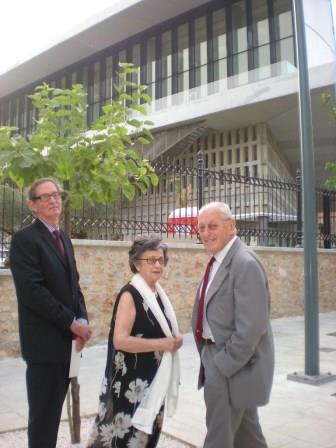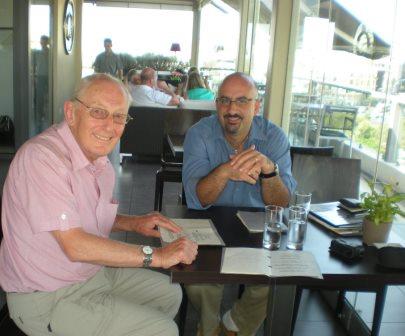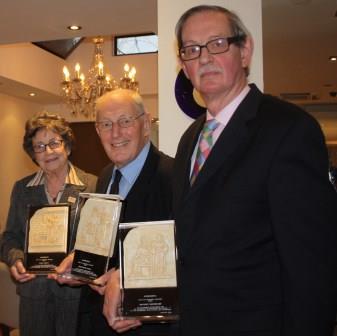
Chris Price, outstandingly educated among parliamentarians, and at the same time sympathetic and universally liked as a man, has died at the age of 83. From the moment of the British Committee’s foundation, now over thirty years ago, he was an active member. What made him irreplaceable, both as member and later as Deputy Chair, was his deep understanding of not merely the political, but the constitutional issues that arise in connection with the Parthenon Marbles.
This enabled him to see through, at best obscurity at worst frustration, between the roles, rights and responsibilities of the government, parliament and the Trustees of the British Museum. More than that, he was personally acquainted with and highly respected by a series of ministers in the Department for Culture, Media and Sport, most of them first elected to Parliament after his own time. Privately, at least, some of them were ready to acknowledge that, in the endless efforts to hold the ‘official line’, the voice of the British public was effectively being drowned.
His other great contribution, in later years, was in promoting the idea of ‘cultural mobility’, of free discussion, between cultural institutions, of the cases where cooperation and the acknowledgment of interdependence could take the place of stone-walling, non-communication and downright triumphalism.
After his first heart attack on New Year’s Day 2010, things were never quite the same again but, thanks in no small degree to his wife Annie’s untiring care, he rallied and participated actively for at least another couple of years. We too shall miss him sorely.
Anthony Snodgrass, Chair, British Committee, 2002-2010

Anthony Snodgrass, Eleni Cubitt and Chris Price in Athens June 2009 for the opening of the Acropolis Museum
Chris Price's contribution to the campaign for the reunification of the Parthenon marbles was distinguished. It was also distinctive. His commitment was grounded in a rare combination of attributes.
Many classical scholars trace their first engagement with the issue from their education. Many were fired by early student experience in Greece. Many have been motivated by moral and cultural considerations. Many have had the gift of eloquent and persuasive argument by pen or tongue. Many have devoted long years to the cause. All this can be said of Chris. But he was also a politician, not tribal - that was perhaps a drawback - but deeply committed and able in the "art of the possible". He was one of that cohort of able Labour MPs who lost the opportunity of a distinguished career in government, quite likely with ministerial responsibility, during the Labour Party's long, lost years after 1979. He did however have the opportunity to show what might have been when appointed to Chair the Select Committee on Education, Science and the Arts, as it was then called. What if he had had the opportunity to serve as Secretary of State with that portfolio? Might we have seen a response to the issue of the marbles based not only good political sense but also on deep understanding and empathy? We'll never know, but we certainly lost the opportunity to find out when Chris went into opposition and then lost his seat. Nevertheless we do have much for which to thank him, we mourn his passing and we offer condolences to Annie and their whole family.
Eddie O'Hara, Chairman

Chris Price with Professor Pandermalis, Acropolis Museum 2009
Christopher Price's struggle for the restitution of the Parthenon Marbles was invaluable and will be missed. We offer our condolences to his family at this sad time.
The Board of Directors of the Melina Mercouri Foundation

"Chris Price was for many a years a champion of the cause to have the Parthenon Sculptures returned from Britain to Greece. He was a brilliant and passionate man and enriched the lives of all of us who were lucky enough to have known him." David Hill, Chairman, International Association for the Reunification of the Parthenon Sculptures.
The American Committee for the Reunification of the Parthenon Sculptures extended their deepest sympathies to the family, friends and colleagues of Chris Price.
Michael Reppas wrote:
"Chris was a positive force in the campaign and his dedication toward the cause should always be remembered. It was an honor to have worked with him and we are all saddened by his loss."

Chris Price with Michael Reppas, President of ACRPS
Obituaries in UK newspapers:
The Guardian
The Telegraph
The Independent
Christopher Price on the sculptures from the Parthenon:
"The only thing British about them is the fact that one of our ambassadors filched them."

Eleni Cubitt, Chris Price and Anthony Snodgrass, Ambassadors of Hellenism
The Marbles Campaign: Where do we go from here?
Christopher Price, 31 May, 2010
Over the past two or three decades, the campaign to re-unite the Parthenon Sculptures in Athens has received global publicity. It is now important, however, for us to consider how to put the issue in a wider international “cultural mobility” context.
“Cultural mobility” is become a common phase among those who want to see an atmosphere of cooperation supplant arguments in the past. A recent conference in Ohio put it like this: Globalization is now one of the most common terms to describe how we interact with other countries in the 21st century. Perhaps a better term is “interdependence.” Interdependence helps us understand how we can have shared opportunities to participate and enjoy a genuine sense of belonging. Collaboration and cooperation are becoming the approaches of choice, replacing the pursuit of short-term exchange. In this context, it is only a period of genuine cooperation between all sorts of institutions – governments, museums and international bodies – that will be able to find solutions.
A wider, even worldwide, discussion about the appropriate location of cultural objects might help begin a genuine bipartite discussion between the UK and Greece about the integrity of classical sculptures currently in the British Museum.
It follows that another priority for campaigning organisations and the UK parliament is to make sure that the respective powers and influence of the Trustees of the British Museum, the British government and the British Parliament are balanced in such a way that there can be a public discussion about how to take this issue forward. The British Museum was established by the British Parliament and notby the British Government; the Trustees hold their office in trust for the people of Britain but yet have made little effort to explain to the people the current position and arguments over the location of the marbles. The Government and Parliament have a similar duty. This is particularly important at a time when the Trustees will soon be seeking a new Director for the Museum. The current director, Neil MacGregor, is a superb communicator. If the Marbles issue is to be solved, his successor will need to be a superb negotiator.
Both the marketing of cultural relics and arguments about their ‘ownership’ are as old as the hills. We now need a new regime of discussions – open to all citizens of the world – which can take the place of insoluble haggling over history, location, ownership and legal status. This will require not so much recourse to national and international courts of law; instead we need a global environment of museums and nations cooperating with one another in which the mobility of cultural objects and agreements about their location and preservation can be discussed without pre-conditions.